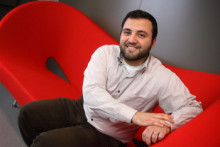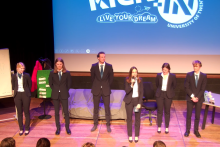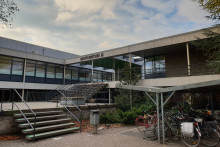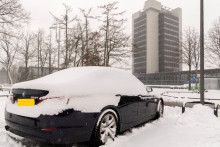‘Solutions cannot always be simple’
Assistant Professor Ahmad Al Hanbali strongly believes his strategic and tactical approach towards maintenance activities contributes to the competitiveness of Dutch manufacturers. ‘High-tech companies are willing to use the theoretical tools coming from Twente to analyze their maintenance strategies.’ Egbert van Hattem Spare parts of complex capital goods are costly nowadays. Nevertheless, downtime or failure of apparatus can cause dramatic consequences, be it MRI scanning equipment, radar systems or complete printer lines. Realizing high availability levels is hardly possible when maintenance is organized by individual users. More and more maintenance activities are shifted to the manufacturers themselves, Dr. Ahmad Al Hanbali points out. ‘In service level agreements, they are responsible for these activities for a large period of time. At the operations management and logistics research group in Twente, we provide these companies with strategic and tactical tools.’ Rational way High-tech companies like IBM, Océ and Thales welcome the theoretical approach, despite the complex processes involved. They possess the right technological atmosphere. Hanbali: ‘They know, in the sphere of technology, solutions cannot always be simple. Investing in analyzing complex processes in a systematic way is for them a rational way of dealing with it, as they know it will pay off at the end, and make them more secure of the products and services that they can offer safely to their customers.’ On the other hand, companies are forced to do so because of the dilemmas involved. For example, spare parts of radar systems are really expensive. You can only buy a few of them and put them on the shelves until they are needed. Hanbali: ‘New service contracts can help speed up the rate of turnover and control high risks. Many items are involved in analyzing these complex systems and scenarios you can imagine to happen if something goes wrong. Our models are aimed to make rational choices, and also to evaluate the results after different periods of time. A possible outcome of these reviews can be that the manufacturer is better off by choosing another strategy, the second best choice after waiting, for example, for a three-month period.’ Last-time buys Another matter of interest is last-time buys. This occurs when there is an end of production of a certain item in a system and the manufacturer is offered the last chance to order the item. Hanbali: ‘The main challenge of last-time buys is to make sure that there is no waste as long as everything functions according to plan. Mending strategies, be it temporary or lasting, can involve dismantling broken machines, fixing parts more often before buying new ones, or repairing expensive items.’ Big companies develop their own roadmaps for repairing strategies and all companies are faced with different apparatus, availability and performance rates. ‘It’s the diversity of challenges that is encouraging me, time and time again, as a researcher,’ Hanbali expresses his passion of his work. Nice chances Being born in Lebanon in 1980, he went to France to further develop his stochastic operations research tools and apply them in a PhD project. While at Nice University, he analyzed the performance of wireless telecom networks. ‘These four years were a big chance for me to learn a broad range of analyzing techniques and apply them to the dynamic environment of everyday use. Most of these techniques I still use now, refining them and finding new areas of interest.’ Hanbali is now in his second year of the tenure track as an assistant professor in the Department of Operational Methods for Production and Logistics at the Faculty of Governance and Management. Before this time, he was a post-doc at the University of Twente and at the EURANDOM research institute, situated at TU Eindhoven. ‘The tenure track lasts five years. If I keep showing good research results, I am confident that the board will offer me the associate professor position. I hope so. Beside the research, I like the teaching aspects and supervising the Master students and PhDs very much.’ With his family, he is now living in Enschede with a profound feeling of security. ‘Lebanon is only a small country, and I estimate it is only about one fourth the size of the Netherlands. Being a Muslim myself, it is not difficult for me to live together with Christians who are pursuing their own goals and living the way they believe is right. All groups in society in Lebanon are represented in the government and social system that functions quite well at the moment. We don’t have walls to separate people. On the other hand, we know quite well the current situation is quasi stable, so to speak, as history has shown several times already.’ Ahmad Al Hanbali: 'A MRI scan costs millions of euros, but failure time is about more than money.'







